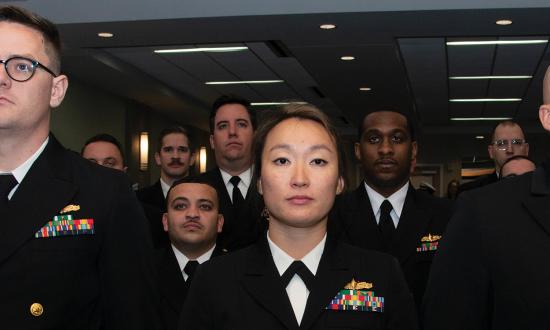Harry Truman is credited with saying, “Not all readers are leaders, but all leaders are readers.” Reading is essential to continued personal growth and understanding, especially for those entrusted to lead. There are countless books on famous leaders and leadership, but the straightforward and honest leadership principles of Cyropaedia: The Education of Cyrus are a great reference for those privileged to lead in the armed forces.
Cyropaedia: The Education of Cyrus by Xenophon was written in the early 4th century BCE, but many of its maxims are still applicable today. The biography follows the life of Cyrus the Great, founder of the Achaemenid Empire. Cyrus is credited as one of the first proponents of human rights, and his military strategy is still studied today. His leadership style can be broken down into three simple concepts: be a sympathetic leader, lead with kindness, and know your people.
Be Sympathetic
In the passage below, Xenophon describes how Cyrus’s father, Cambyses I, teaches him the importance of being sympathetic and relating to every subordinate, peer, and superior:
Yes, my child, but to do good really at all seasons to those we wish to help is not always possible: only one way is ever open, and that is the way of sympathy; to rejoice with the happy in the day of good things, to share their sorrow when ill befalls them, to lend a hand in all their difficulties, to fear disaster for them, and guard against it by foresight—these, rather than actual benefits, are the true signs of comradeship.
The lesson is that leaders sharing in the successes and sorrows of those they lead is essential to gaining their trust and confidence. It takes a constant, concerted effort to lead a group to success and help them avoid failure. Possibly more important than praise for success is humility and understanding in failure. Sharing the burden of failure is a source of relief for those experiencing it; it shows a leader’s commitment and leads to a stronger bond. If you can accomplish these things, those you lead will follow your guidance and orders when the costs are elevated.
Leaders must never overlook their responsibility as commissioned officers. Officers are expected to order sailors into battle without hesitation and be prepared to make life or death decisions. The trials and tribulations leaders and their subordinates face together must be met with sympathy and understanding.
Lead with Kindness
Xenophon elaborates further on Cyrus’s views on leadership. To earn the trust of those they lead, a leader does not use their rank or position but their actions and words:
If we require good workers and good comrades in any task whatever, it is better and pleasanter to encourage them by kind speeches and kindly acts than to drive them by pains and penalties. And if it is for war that we need such trusty helpers, we can only win the men we want by every charm of word and grace of deed. For our true ally must be a friend and not a foe, one who can never envy the prosperity of his leader nor betray him in the day of disaster.
Punishment is often warranted or even required, in certain circumstances but the threat of punishment should not be a source of motivation for those you lead. Cyrus explains the importance of a leader’s words and actions toward their subordinates. Kindness, especially in the armed forces, must not be discounted. Treating everyone with kindness is critical for success and possibly more important if someone fails. Leaders who treat subordinates and peers with kindness and respect will be supported through their own failures when they inevitably arise.
The strength of a leader can be seen in those they lead; the success of a leader is simply a product of their sailors’ successes. By motivating them with kindness and respect rather than with fear of reprisal, leaders strengthen that bond and earn their trust, as Cyrus understood more than two millennia ago.
Know Your People
Arguably the most powerful passage in the book breaks down leadership into its simplest form:
The fact was Cyrus took special pains over this: it struck him as odd that a mere mechanic could know the names of all his tools, and a physician the names of all his instruments, but a general be such a simpleton that he could not name his own officers, the very tools he had to depend upon each time he wanted to seize a point or fortify a post or infuse courage or inspire terror. Moreover it seemed to him only courteous to address a man by name when he wished to honor him. And he was sure that a man who feels he is personally known to his commander is more eager to be seen performing some noble feat of arms, and more careful to refrain from all that is unseemly and base.
Leaders must take an interest in those they lead. This, of course, can be applied in any relationship but particularly when one is in a position of authority. Subordinates are the determinants of the group’s success. Taking an interest in them—asking about their weekend, their families, or their interests—and listening and processing that information creates a bond. Leaders will gain a better understanding of that person, and they will know you are taking an interest in them as a human being and not just a service member.
Knowing your people personally can become contagious and will create a better and more cohesive group. Once you begin to learn more about those you lead, you will have a better understanding of their varied backgrounds and more easily recognize when something is troubling them. You will be able to process what is going on in their personal lives and how that may affect their performance at work. Making a concerted effort to know not just their names as Cyrus states, but also who they really are is essential to fostering trust and gaining acceptance from your subordinates.
Leaders are responsible for continuing to grow their leadership capabilities through continued scholarship. Xenophon’s book on Cyrus the Great is an excellent reminder that following simple principles such as sympathy, kindness, and investment in those we are privileged to lead is a great starting point.
Source
Xenophon, Cyropaedia: The Education of Cyrus (Project Gutenberg, 2009).








